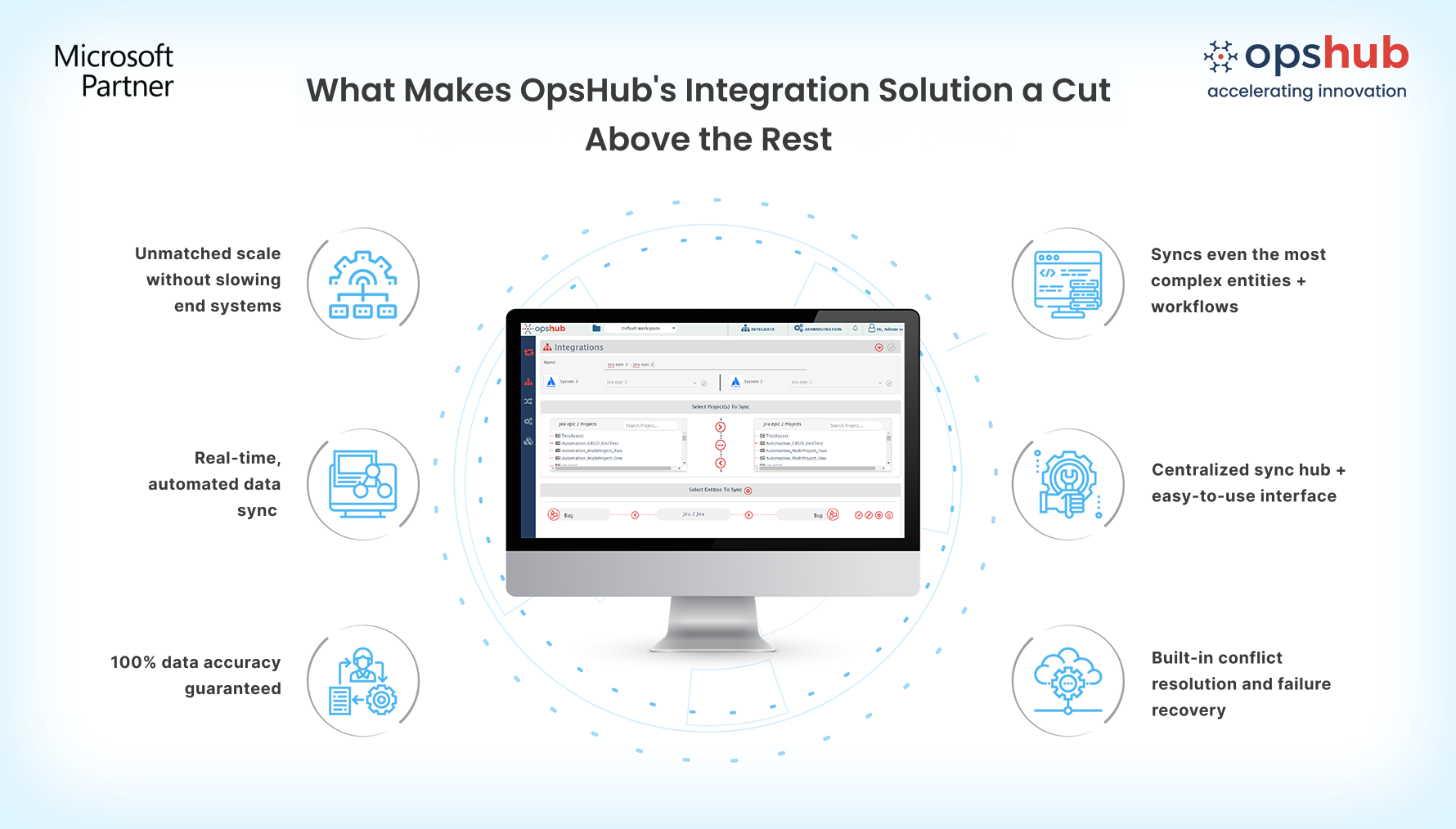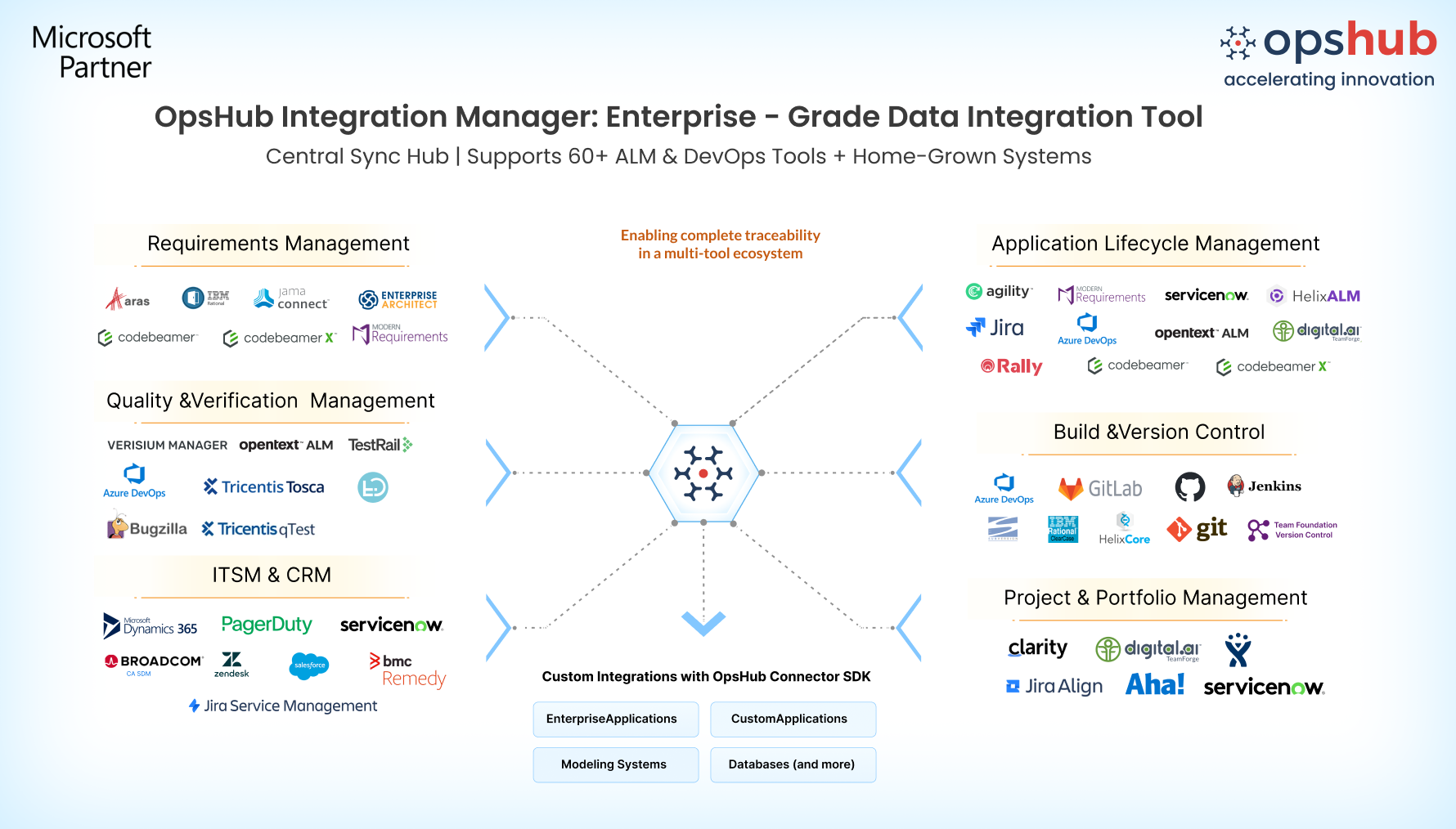Overview
When Rally and Azure DevOps systems operate in isolation, development and product teams are caught in the friction of fragmented data, tedious manual processes, and misaligned priorities. This, in turn, leads to data loss, errors, and delayed delivery timelines.
OpsHub Integration Manager (OIM), an enterprise-grade solution seamlessly connects Rally and Azure DevOps through an automated, real-time, bidirectional synchronization of user stories, tasks, features, among others. It ensures 100% data accuracy, giving teams complete visibility into changes, deletions, histories, and attachments. This keeps all data contextual, providing both teams with up-to-date information, reducing manual work, and minimizing miscommunication. As a result, delivery timelines remain on track, enabling faster software releases.
Learn about Rally - ADO integration using OIM
Why OIM for Azure DevOps Rally Integration
Scale seamlessly across projects: OIM is built to handle growing business needs, regardless of the size of teams or projects. End systems operate seamlessly, and workflows remain uninterrupted.
Sync best-of-breed tools with ease: With extended integration support for over 60 ALM, DevOps, and ITSM tools, OIM also integrates home-grown or custom connectors.
Ensure unmatched control with centralized interface: Sync application data without coding expertise or manual effort.
Integrate beyond standard entities: Sync test results, defects, test cases, mentions, comments, attachments, links and more, including custom work items with complete history.
Keep project structures intact: When an entity is moved from Project A to Project B, OIM ensures it is not left behind as an orphan and that the transition remains smooth.
Ensure entity movement visibility: Changes like renaming an entity are reflected in the target system, keeping data aligned.
Gain multiple deployment options: OIM offers both on-premise and cloud deployment modes.
Ensure robust error handling: With built-in conflict resolution, real-time error detection, advanced failure recovery, and detailed logs, OIM ensures data integrity even during failures.
Drop us a line for a Free Demo to watch how OIM facilitates Rally and Azure DevOps bidirectional integration.

Popular Use Cases
OIM has helped the biggest enterprises with the following use cases:
Seamless requirement traceability: Product manager in Rally define requirements, which sync as user stories and tasks in Azure DevOps, enabling developers to track the full lifecycle from requirement to delivery.
Real-time status updates: Development progress in Azure DevOps, including status, estimates, and comments, syncs back to Rally, keeping product managers informed of delivery timelines and potential bottlenecks.
Defect management: Defects logged in Rally are automatically synced as work items in Azure DevOps, ensuring developers can address issues promptly without manual duplication.
Change management: Real-time synchronization of changes to features, stories, or requirements ensures all stakeholders are aligned on scope adjustments and timelines.
Cross-team collaboration: Development team in Azure DevOps and product manager in Rally collaborate efficiently with consistent, up-to-date data, fostering alignment and reducing miscommunication.
Integrate Rally and Azure DevOps in 5 Easy Steps
OpsHub Integration Manager (OIM) offers an easy-to-use GUI and an intuitive user experience, enabling users to configure the Azure DevOps (VSTS/TFS) and Rally unidirectional or bidirectional integration with ease.
Configure Azure DevOps and Rally systems.
Select project(s) to be integrated.
Select entity(s) to be integrated.
Select sync direction and sync filter.
Click and map fields to be integrated.
Make your rALLY and ADO systems work as one. No rework. No delays. Just clean, reliable integration. Try OpsHub for Free..

The Final Word
Selecting the appropriate solution for integrating Azure DevOps and Rally is vital for handling complexities like large data volumes, ensuring data consistency, and managing diverse workflows. While plugins might offer a quick solution in the short run, they often fail to deliver the scalability, reliability, and enterprise-grade features necessary for robust integrations in the long run.
Connect with our Integration Engineer to discuss your use case. to let us help you with your data integration requirements.



